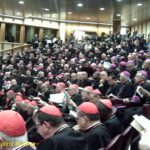I’ve been to London today for a Celebration and Consultation on self supporting ministry. The Celebration was in Southwark Cathedral and marked the 50th anniversary of the first ordinations from the Southwark Ordination Course in 1963. The consultation was with around 80 people from most of the Dioceses in the Church of England about the nature and the future of self supporting ordained ministry.
All the material from the consultations will be on the Ministry Division website in due course but here is my sermon from the Cathedral this morning
Generosity, humility, liminality A Sermon at “A New Pattern of Priesthood” Celebration and Consultation Southwark Cathedral 17th May, 2013
“When they had finished breakfast, Jesus said to Simon Peter, “Simon, son of John do you love me more than these?”[1]
All of us here will have reflected many times on this encounter between Simon Peter and the Lord. St. John tells the story as a lesson in grace, restoration and love. But it is especially a story about vocation and the vocation to feed Christ’s own flock, bought by the shedding of his blood on the cross.
For many it is a story which recurs in the account of our own vocation to be priests in the Church of God, a story to which we return again and again as we understand more deeply what it is to offer our lives to this ministry. A few months ago, I stood beside the excavated tombs underneath the altar of St. Peter’s Basilica in Rome reputed to be the tomb of Peter himself and listened again to these familiar words and once again was deeply moved. In this encounter Jesus calls Simon the son of John to become once again Peter, the living rock from which the church will be fashioned.
A key moment in the story is the phrasing of the first question and Simon Peter’s reply. “Simon, son of John, do you love me more than these?”
Here is a question which invites an extravagant, passionate, declaration of love and faithfulness. Here is a question which tests our hearts in a number of different ways. Simon Peter reply reveals he knows himself only too well. His love has been tested and is deep and real yet so is his knowledge of himself. He declines the invitation to compare himself with others and replies, simply: “Yes, Lord, you know I love you”. “Feed my lambs”.
We celebrate today a very significant development in ordained ministry in the Church of England. Fifty years ago the first candidates were ordained from the Southwark Ordination Course heralding the development of new forms of training and new patterns of ordained ministry. These new patterns of priesthood have been and are an immense blessing to the kingdom of God and to the Church. With the hindsight of fifty years, those ordinations stand out as a landmark in the development of the life of the Church of England. Like the Great Wall of China they are visible from space. The new patterns of priesthood which flowed from them continue to develop. We continue to explore and understand the gift we have been given. These new patterns are likely to be more not less significant in the fifty years to come.
So it is right that we should celebrate today the generosity and grace of God in these ministries. It is right that we should celebrate the gifts and foresight of those who led this development in the life of Southwark Diocese and the wider church: the prophets, like Roland Allen, the bishops, especially Mervyn Stockwood and John Robinson, the staff of the Southwark Ordination Course and its cousins and successors.
Stockwood writes eloquently about the Course in his autobiography. In his enthronement sermon in this Cathedral he said “I should like to see cautious experiments with a new type of priesthood and a new type of organization”[2]. The ideas, like all new ideas were resisted. Stockwood wrote twenty years later: “I put my plans to the meeting of bishops. They were not enthusiastically received, least of all by those who had been principals of theological colleges and who found it difficult to believe that there could be an alternative method of training”. The words may sound familiar. I couldn’t possibly comment.
It is right that we should celebrate, above all, the gifts and skills of those who have offered their lives as deacons and priests in these ministries and have been a blessing to God’s people and to the world.
What are the benefits of this kind of training? What is it that characterizes this new pattern of priesthood which we have called by so many different acronyms?
Twenty years after the Southwark Ordination Course was founded, Mervyn Stockwood was very down to earth in his reflections. He lists four benefits of the course. “1. It accepted men of different persuasions and trained them together where most colleges cater for a single point of view.” A revolutionary effect. “2. The men did not learn their theology in a vacuum.” Contextual theology was established. “3. It taught men to work hard.” I quote: “There are too many clergy in the Church of England who are acquainted with only one verse in the Holy Scripture namely how “to be at ease in Sion”. “4. It was sound economics.” That remains true today.[3]
But fifty years on, let me offer you three words for reflection.
These different forms of self-supporting ministry are characterized first of all, it seems to me, by generosity. They are by definition a gift. A gift of time given to vocational exploration and to training which is costly to the candidate and to their family. A gift of time and of self given to ministry without financial reward or gain. A gift of service sustained in similar ways over many years. Self supporting ministry and stability seem to go together. A gift of love for the Lord and for his church. As John Chrysostom says, Jesus calls Peter to demonstrate his love for the Lord by care for his flock. This new pattern of priesthood is characterized first by generosity.
Second, this new pattern of priesthood is characterized, it seems to me, by humility. Humility is present as we have seen in Peter’s answer. It is enough to say: “Yes Lord you know I love you”. There is no need to compete with the love offered by others. It is enough to offer what we can. Self supporting ministries offer servant leadership in a particular way. Those who serve in this way have to offer what they can, constrained by time and circumstances, and offer what is needed. They are not caught up in temptations to ambition or influence which afflict those called to stipendiary ministry. This is a liberating gift to the priests themselves and to the wider church though it has its cost. It is a pattern of priesthood shaped by humility.
Third, I suggest, this new form of priesthood is shaped by liminality: by living permanently on the edge and between two or more worlds. This can be a blessing. It can also be complex and demanding as many here will know. But it is a precious gift to the wider church and has many lessons for a church in mission.
A new pattern of priesthood. A pattern which is still unfolding. A pattern of priesthood characterized by generosity, humility and liminality. How is the wider church called to respond to such a pattern?
The generosity at the heart of self supporting ministry calls for appreciation to be shown by the wider church. We should be saying thank you often and loudly and registering that appreciation in a range of different ways. All too often we have not done that. Those who trained on courses or offer self supporting ministries have felt undervalued. Fifty years on we need to turn a page and grow up. The Church needs to do better.
The humility at the heart of self-supporting ministry calls for recognition on the part of the wider church. We need to recognize especially the immense wisdom which those called to ministry in these way have to offer the wider body of Christ. Self-supporting ministers seldom exercise power and authority within the Church for all kinds of reasons. But space needs to be created for them to exercise influence and speak more into our counsels.
And the liminality at the heart of self-supporting ministry calls for anchoring and security on the part of the wider church. It is always difficult to live between two worlds. One of the things you need are secure lines of connexion and accountability which are both personal and institutional. As all the research indicates, self supporting ministers are not self supporting in this sense: they need support from their bishops and dioceses in order to sustain this edgy and liminal pattern of priesthood which is so vital for God’s mission.
Generosity calls for appreciation. Humility calls for recognition. Liminality calls for security. For here’s the mystery. The new patterns of priesthood in the economy of God have simply revealed more clearly what it means to be a priest in the Church of God. For every priest, of course, is called to be generous, to be humble, to live between two worlds.
We will see the patterns continue to change and evolve in the next fifty years, I am sure. I hope that more and more we will lose the distinction between priests who are stipendiary and priests who are self supporting. I hope that all of us will learn to be generous, to be humble, to be liminal. I hope that we will grow a single ministerial priesthood in which some of us, for some of our lives, receive financial support. I hope that as a church we will be offer greater appreciation, stronger recognition and more sure footed mutual support.
And I hope that each of us here this day will be inspired by what God has done through the Southwark Ordination Course and it’s students. I pray we may be inspired in our own day to think outside the traditional structures and see new patterns of ministry and training develop. And I pray that each of us would hear once more the question which lies at the heart of our vocation:
“Simon, son of John, do you love me more than these?” “Yes, Lord, you know that I love you”. “Feed my lambs”.
[1] John 21.15
[2] Mervyn Stockwood, Chactonbury Ring, Sheldon Press, 1982 p.102
[3] ibid p. 107



When are we going to have self-supporting bishops, do you think?